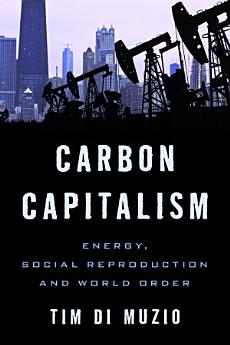Carbon Capitalism: Energy, Social Reproduction and World Order
Aug 2015 · Bloomsbury Publishing PLC
Ebook
216
Pages
reportRatings and reviews aren’t verified Learn More
About this ebook
Modern civilization and the social reproduction of capitalism are bound inextricably with fossil fuel consumption. But as carbon energy resources become scarcer, what implications will this have for energy-intensive modes of life? Can renewable energy sustain high levels of accumulation?? Or will we witness the end of existing capitalist economies?
This book provides an innovative and timely study that mobilizes a new theory of capitalism to explain the rise and fall of petro-market civilization. Di Muzio investigates how theorists of political economy have largely taken energy for granted and illuminates how the exploitation of fossil fuels increased the universalization and magnitude of capital accumulation. He then examines the likelihood of renewable resources providing a feasible alternative and asks whether they can beat peak oil prices to sustain food production, health care, science and democracy.
Using the capital as power framework, this book considers the unevenly experienced consequences of monetizing fossil fuels for people and the planet.
This book provides an innovative and timely study that mobilizes a new theory of capitalism to explain the rise and fall of petro-market civilization. Di Muzio investigates how theorists of political economy have largely taken energy for granted and illuminates how the exploitation of fossil fuels increased the universalization and magnitude of capital accumulation. He then examines the likelihood of renewable resources providing a feasible alternative and asks whether they can beat peak oil prices to sustain food production, health care, science and democracy.
Using the capital as power framework, this book considers the unevenly experienced consequences of monetizing fossil fuels for people and the planet.
About the author
Tim Di Muzio is a Senior Lecturer in the School of Social Inquiry at the University of Wollongong. He is the author of The 1% and the Rest of Us and with Richard Robbins, Debt as Power among other works
Rate this ebook
Tell us what you think.
Reading information
Smartphones and tablets
Install the Google Play Books app for Android and iPad/iPhone. It syncs automatically with your account and allows you to read online or offline wherever you are.
Laptops and computers
You can listen to audiobooks purchased on Google Play using your computer's web browser.
eReaders and other devices
To read on e-ink devices like Kobo eReaders, you'll need to download a file and transfer it to your device. Follow the detailed Help Center instructions to transfer the files to supported eReaders.






